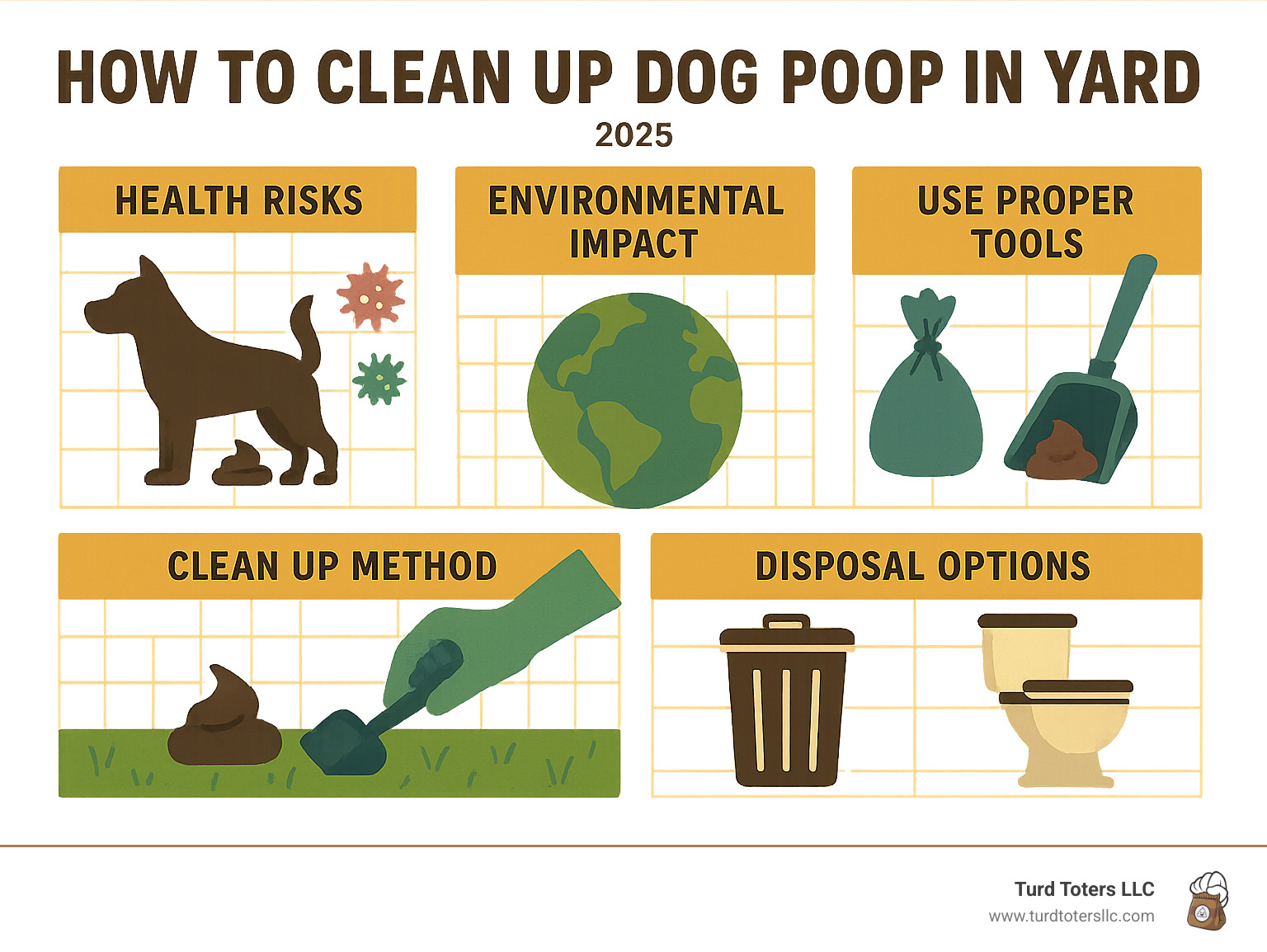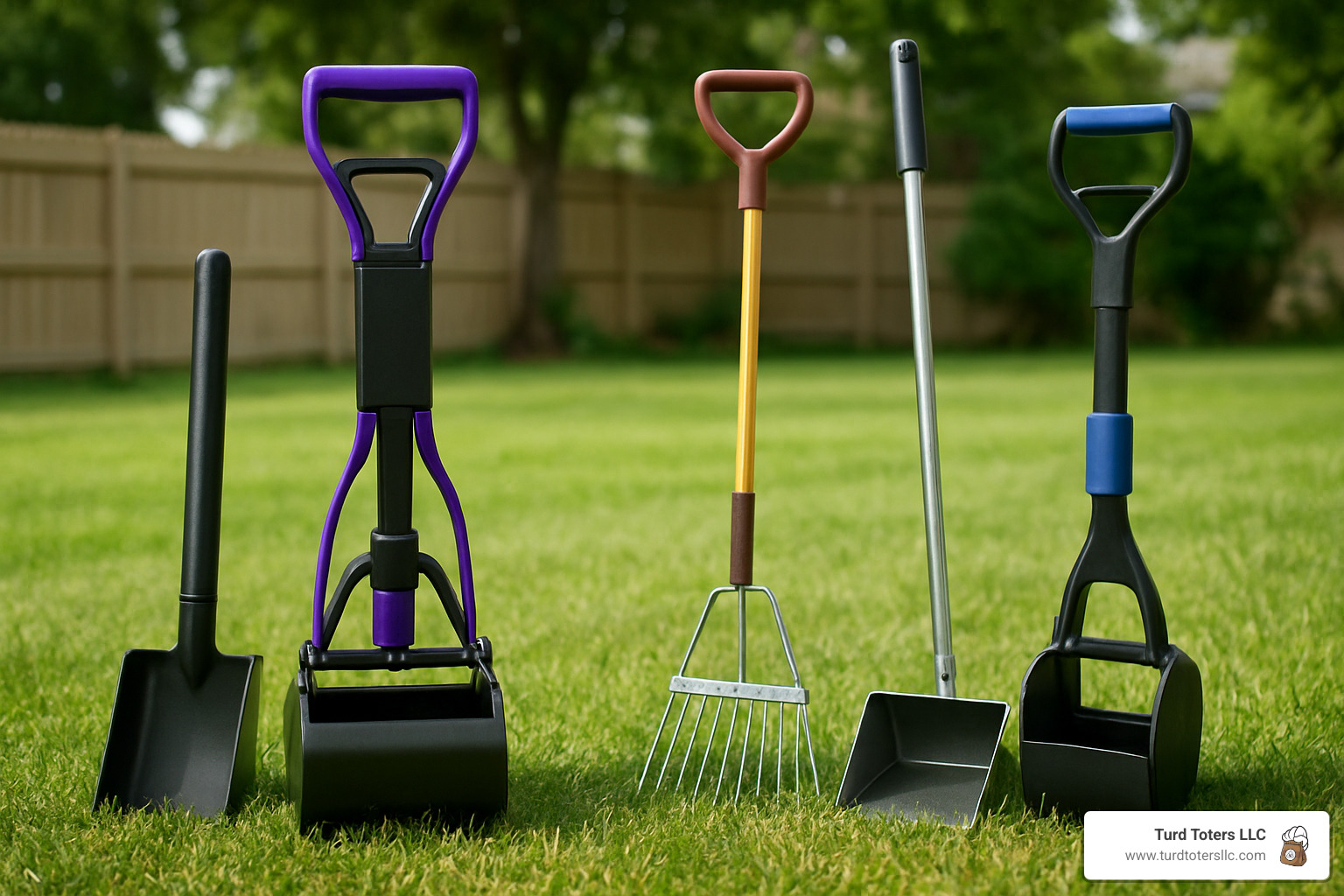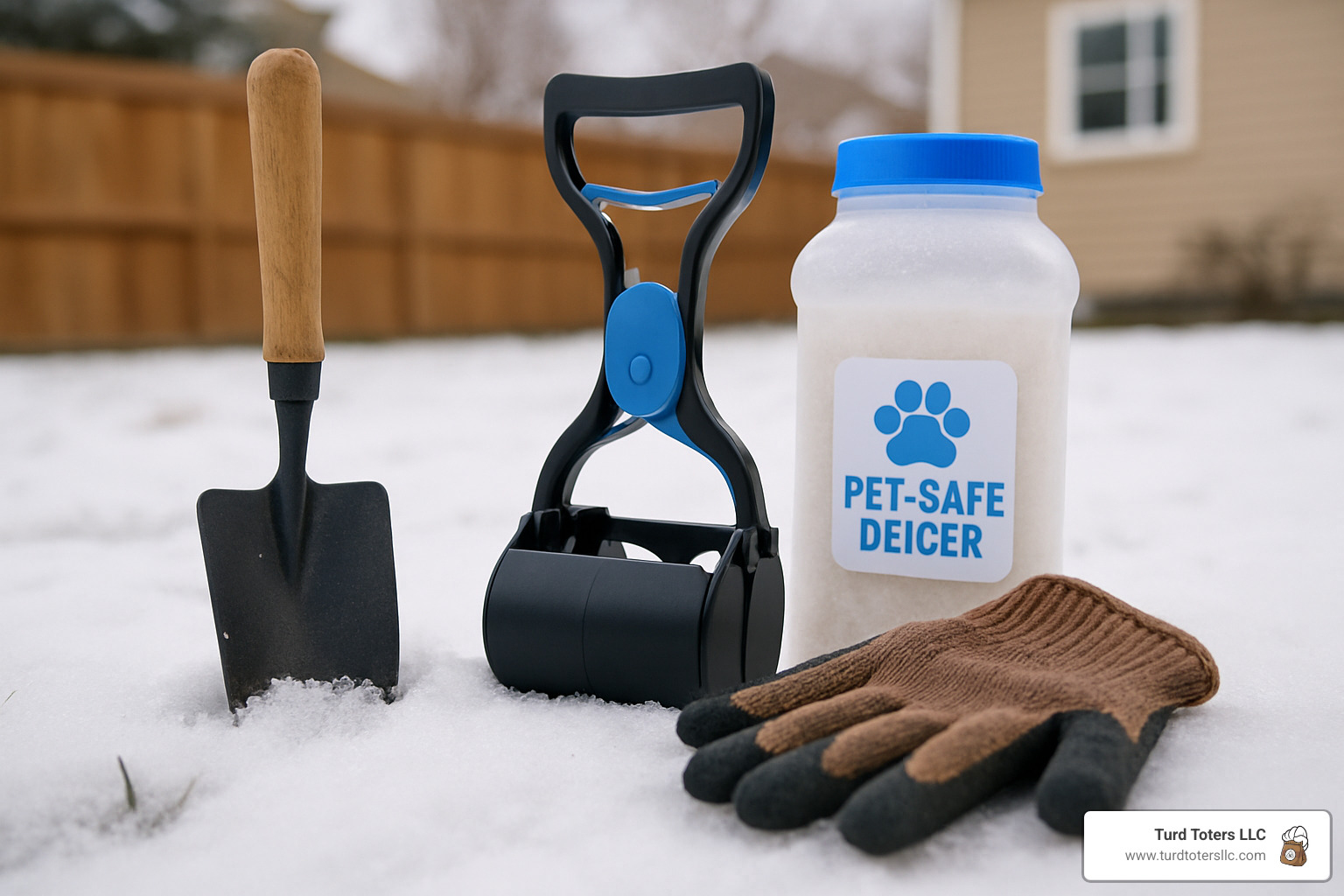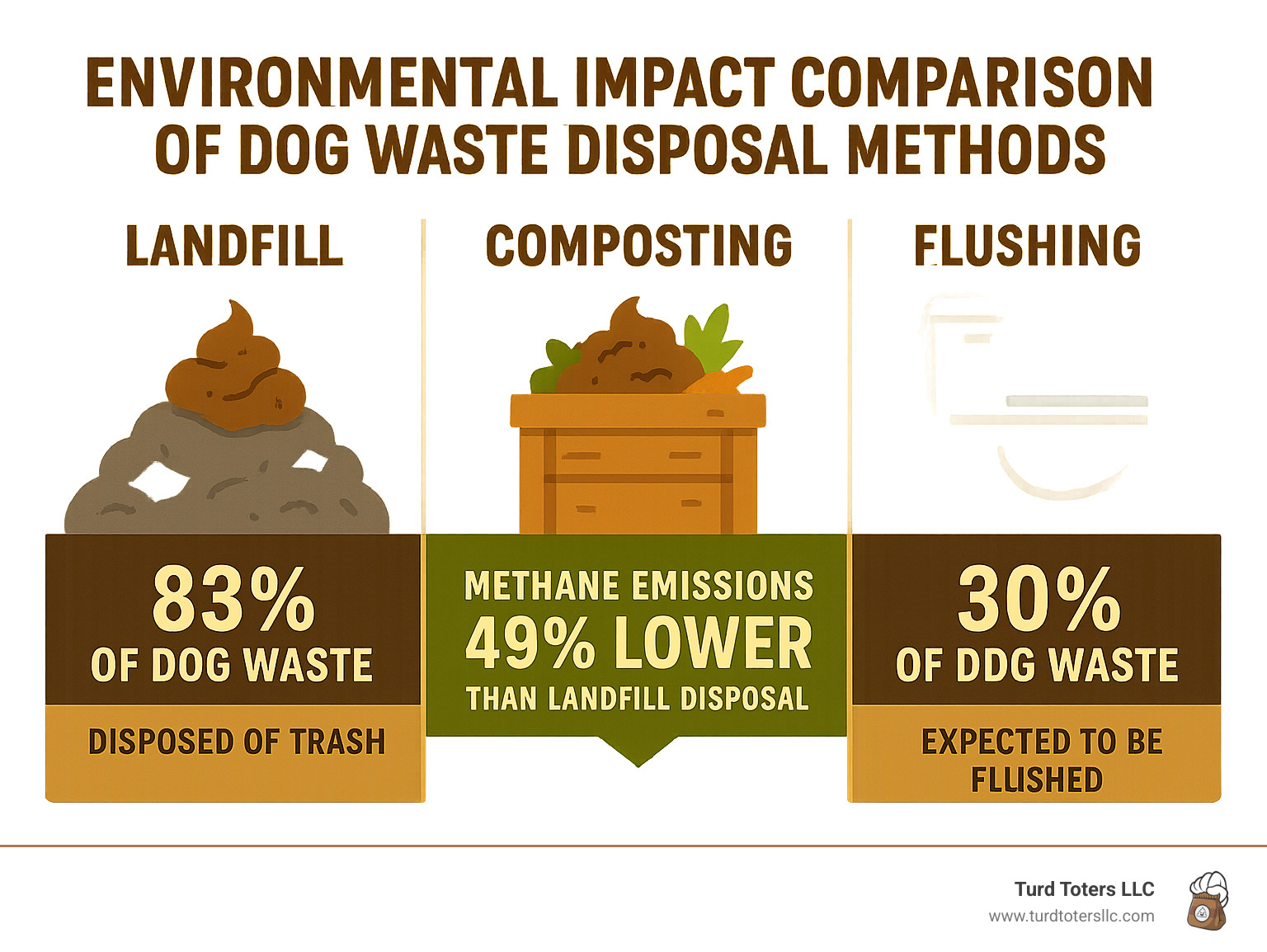Why Dog Poop Cleanup Is Essential for Your Georgia Yard
How to clean up dog poop in yard starts with understanding why this task matters so much for your family’s health and your property’s appearance. Here’s what every Georgia pet owner needs to know:
Quick Steps to Clean Up Dog Poop:
- Use a pooper scooper or plastic bag to collect solid waste
- Work in a grid pattern across your yard to find all deposits
- Double-bag the waste and dispose in trash or flush down toilet
- Spray the area with enzyme cleaner to eliminate odors
- Wash hands thoroughly with soap and water
As a Georgia pet owner, you’re dealing with more than just an unpleasant chore. Dog waste contains harmful bacteria like Salmonella and E. coli that can make your family sick. According to research, dog poop carries about 50% bacteria and up to 23 million fecal coliform bacteria per gram.
The environmental impact is serious too. Urban areas have an average of 125 dogs per square mile – far more than the 2 dogs per square mile that ecosystems can naturally handle. When Georgia’s frequent rainstorms hit, that waste washes into storm drains and contaminates local waterways.
Many Georgia communities also have legal requirements for pet waste cleanup, with fines for violations. Beyond the rules, regular cleanup prevents your lawn from developing brown spots, reduces fly problems, and keeps your outdoor space welcoming for family gatherings.
The good news? With the right tools and a simple routine, yard cleanup becomes quick and manageable – or you can hire professionals to handle it completely.

Why You Must Pick Up Dog Poop
Dog waste isn’t just an eyesore – it’s classified by the Environmental Protection Agency as a genuine pollutant that threatens both human health and local waterways. Dog poop contains dangerous bacteria like Salmonella, E. coli, and Yersinia that cause serious food poisoning, plus parasitic roundworms that can cause blindness in children who accidentally ingest contaminated soil.
Unlike cow manure used as fertilizer, dog waste is highly acidic and packed with excessive nitrogen. Instead of helping your lawn grow, it burns grass and damages plants, leaving brown spots that make your yard look neglected.
When Georgia’s thunderstorms hit, accumulated pet waste washes directly into watersheds. For detailed scientific research on pet-poop pollution, the EPA documents how this contamination harms local water quality.
Most Georgia cities and counties have leash laws and pooper-scooper ordinances requiring immediate waste removal, with fines typically ranging from $50 to several hundred dollars.
Hidden Health Dangers for Pets & People
Health risks extend beyond the obvious. When dogs walk through old waste and lick their paws, they can ingest harmful bacteria and reinfect themselves with parasites. Roundworm larvae can survive in soil for years and are particularly dangerous for children, potentially causing vision loss if they reach the eyes.
Zoonotic diseases like giardia, leptospira, and parvovirus can jump from animals to humans, causing severe gastrointestinal illness. Even dried waste particles can become airborne during yard work, creating inhalation risks for anyone with compromised immune systems.
Dogs, children, and adults can track waste particles on shoes and paws throughout your home, creating ongoing health risks that persist on carpets and furniture long after visible waste disappears.
Environmental & Legal Consequences
Georgia’s frequent rainstorms carry unmanaged dog waste directly into storm drains, which flow untreated into local streams and rivers. This contamination contributes to algae blooms, fish kills, and beach closures affecting entire communities.
The EPA has classified pet waste as a significant source of water pollution, ranking it alongside oil spills and chemical runoff. In urban areas like Augusta and Evans, dog concentrations far exceed what natural ecosystems can handle.
Legal consequences vary throughout Georgia, but most communities have ordinances requiring immediate cleanup. Violations can result in fines, and repeat offenders may face increased penalties. Some homeowners associations also enforce specific pet waste management rules affecting property values and neighborhood relationships.
Must-Have Tools & Supplies for Easy Cleanup
Having the right tools makes how to clean up dog poop in yard efficient and sanitary. A reliable pooper scooper keeps your hands clean and your back happy – choose spring-loaded models for grassy areas or wire rake styles for varied surfaces.
Biodegradable waste bags serve as your eco-friendly backup, perfect for walks or when the scooper isn’t handy. Pair these with disposable gloves for extra protection during messier situations.

Specialized supplies become lifesavers during challenging cleanup. Freeze spray can solidify runny waste for easier pickup, while clumping cat litter transforms loose stools into manageable clumps. Enzyme-based cleaner neutralizes odors and breaks down organic residue.
Practical extras include a flashlight for early morning cleanups, hand sanitizer, and a dedicated outdoor trash bin with tight-fitting lid. Garden lime helps control persistent odors (use sparingly), and white vinegar serves as a natural disinfectant. For detailed strategies, check out our Dog Poop Removal Tips.
Choosing the Right Pooper Scooper
Spring-loaded scoopers excel on grass and soft ground, clamping around waste without requiring bending. Wire rake scoopers work best on gravel or mulch, letting clean material fall through while collecting waste. Spade-style scoopers offer precision on concrete and hard surfaces.
Ergonomic handles reduce bending and strain. Long handles with padded grips prevent hand fatigue, and some models offer adjustable lengths for multiple users or compact storage.
Handy Add-Ons That Save Time
A dedicated pail with lid stores waste between trash collection days. Leash bag dispensers attach to your dog’s leash ensuring you’re never unprepared. Washable boot covers protect regular footwear during messy sessions, especially valuable during Georgia’s muddy spring months.
Consider a small garden sprayer filled with enzyme cleaner for immediate odor treatment, preventing lingering smells and discouraging repeat visits to the same spots.
How to Clean Up Dog Poop in Yard: Step-By-Step Guide
Mastering how to clean up dog poop in yard becomes easier with a proven system. Work in a systematic grid pattern across your yard, starting at one corner and walking in overlapping strips to ensure you don’t miss anything.
Daily walk-through timing matters – early morning or evening works best during Georgia’s hot summers. Always aim for pre-rain pickup since soggy waste is much harder to handle. Double-bag every pickup to prevent leaks, and always wash hands thoroughly with soap after cleanup.
Finish by spraying odor neutralizer on spots where waste was sitting to break down remaining organic matter and eliminate scents that encourage repeat use.
How to Clean Up Dog Poop in Yard on Grass
For how to clean up dog poop in yard on grass, use a clamp scooper positioned around waste – squeeze gently and the clamps lift cleanly without mashing into your lawn.
For stubborn or soft waste, sprinkle clumping cat litter on top and wait a few minutes. The litter absorbs moisture and creates a solid mass that scoops easily.
After removal, give the area a gentle hose rinse with low water pressure, then follow with lawn disinfectant that’s safe for grass to eliminate lingering bacteria.
How to Clean Up Dog Poop in Yard on Concrete & Decks
Hard surfaces need different strategy for how to clean up dog poop in yard cleanup. Use a spade scooper or putty scraper to lift solid waste precisely without smearing.
Enzyme cleaner works fantastically on concrete and deck surfaces. Spray generously, let sit as recommended, then scrub with a scrub brush. Those enzymes break down organic matter and eliminate odors that soak into porous materials.
For stubborn spots, mix white vinegar and dish soap with water, scrub thoroughly, then power rinse with clean water to remove all residue.

Winter & Frozen Poop Challenges
Georgia winters create frozen waste challenges. Use a small blade garden shovel for better control when chipping ice-encased deposits. Apply pet-safe deicer to your dog’s elimination spots before temperature drops to prevent waste from freezing solid.
Take advantage of warm winter days for thorough cleanup when waste softens enough for normal techniques. Compressed air freeze spray can help with partially frozen waste by making it completely solid and easier to pick up cleanly.
Dealing With Diarrhea or Loose Stools
Let diarrhea dry overnight when possible – cleaning wet, runny waste usually spreads it around. Use a putty scraper to remove solid material, working from outside edges toward center.
Disposable rags help absorb remaining moisture, but don’t press hard. Instead, sprinkle clumping litter generously over residue and give it time to absorb before scooping. Enzyme spray becomes essential after diarrhea cleanup – apply liberally and allow extra time for breakdown.
Eco-Friendly Disposal & What to Avoid
Responsible disposal is a crucial part of how to clean up dog poop in yard that protects both the environment and public health. The EPA and USDA recognize several acceptable disposal methods, each with specific benefits and requirements.
Composting dog waste is possible but requires following strict USDA guidelines and using a dedicated pet waste composter separate from food garden compost. The process requires specific temperature ranges and composting materials to safely neutralize pathogens. Mix one-third pet waste with one-third food scraps and one-third grass clippings for proper decomposition.
Flushing dog waste down the toilet is actually recommended by the EPA as an environmentally friendly option. Treatment plants are equipped to handle waste and remove pollutants, similar to how they process human waste. However, never flush plastic bags, and check local regulations as some municipalities prohibit this practice.
Interestingly, some cities have experimented with using dog waste to generate methane gas for powering street lamps. While not widely available, this innovative approach shows how dog poop can power street lamps and contribute to renewable energy.
Standard plastic bags take over 1,000 years to break down in landfills, making biodegradable bags a much better choice for regular disposal. These bags decompose much faster while still providing necessary sanitation during transport and storage.
Avoid using dog waste as garden fertilizer, especially around food plants. Unlike livestock manure, dog waste is too acidic and contains pathogens that make it unsuitable for direct garden application.
| Disposal Method | Environmental Impact | Convenience | Cost | Best For |
|---|---|---|---|---|
| Trash Bin | Moderate (landfill) | High | Low | Most households |
| Toilet Flushing | Low (treated) | Medium | Very Low | Small amounts |
| Pet Waste Composting | Very Low | Low | Medium | Dedicated gardeners |
| Enzymatic Dissolving | Low | Medium | Medium | Occasional use |

Building a Stress-Free Cleanup Routine
The secret to mastering how to clean up dog poop in yard maintenance is creating an effortless routine. Most Georgia pet owners find success with daily or every-other-day cleanup schedules that prevent overwhelming accumulation.
Set phone reminders for the same time each day until the habit sticks. Early morning beats the heat and starts your day productively, while evening cleanup lets you unwind outdoors.
Create a designated potty zone for your dog away from patios and play areas. This concentrates waste in one predictable location, turning whole-yard searches into quick corner visits. High-quality dog food makes cleanup easier – better nutrition means less waste overall and firmer, easier-to-scoop deposits.
Rainy day preparation keeps your routine on track during Georgia’s unpredictable weather. For families, age-appropriate cleanup chores can become bonding activities that teach responsibility.
If building your own routine feels overwhelming, our Weekly Dog Poop Removal service handles everything automatically.
Training Your Dog to Use One Spot
Teaching your dog to eliminate in one designated area transforms cleanup from treasure hunt to predictable task. Choose your spot wisely – accessible for cleanup but away from family areas.
Positive reinforcement works like magic. Take your dog to the spot on leash, use consistent commands like “go potty,” and celebrate enthusiastically when they eliminate there. Scent markers help establish the area – initially leave small amounts of waste there since dogs prefer eliminating where they smell previous deposits.
Patience pays off – most dogs need several weeks to reliably use their designated area. Stay consistent and keep rewarding success.
Preventing Future Messes
Diet adjustments dramatically improve cleanup experience. Higher-quality foods with better digestibility create firmer, more manageable waste. If your dog eats their own waste, commercial deterrent products help break this cycle.
Regular veterinary checkups catch digestive issues before they become cleanup nightmares. Loose stools or sudden changes often signal health problems much easier to address early.
When to Call a Professional Pooper Scooper
Let’s be honest – sometimes the best answer to how to clean up dog poop in yard is simply “let someone else do it.” There’s no shame in admitting that life gets busy, or that scooping poop just isn’t your favorite way to spend time outdoors.
One-time spring cleaning is incredibly popular here in Georgia. After our mild winters, many homeowners find they’ve fallen behind on yard maintenance. Maybe the kids got busy with school, or work got hectic, or you simply avoided going outside during those chilly February mornings. A professional service can tackle months of accumulated waste in one thorough session, leaving your yard fresh and ready for spring entertaining.
Vacation coverage is another game-changer. Instead of asking your neighbor to handle this less-than-pleasant favor, you can arrange professional service while you’re away. Your yard stays clean, your neighbor stays happy, and you return home to a pristine outdoor space instead of an unpleasant surprise.
Mobility issues make yard cleanup genuinely challenging for many pet owners. Arthritis, back problems, or other physical limitations shouldn’t mean you can’t enjoy having a dog. Professional services provide a practical solution that keeps your yard healthy without putting strain on your body.
Multi-dog households often reach a tipping point where daily cleanup becomes overwhelming. One dog’s waste is manageable, but three or four dogs can produce more waste than most people want to handle regularly. The math is simple – more dogs mean more time spent cleaning, and that time adds up quickly.
Some HOA requirements specifically mandate regular yard maintenance that includes waste removal. Professional services ensure you stay compliant with community standards while providing documentation of proper maintenance if needed for HOA records.
Yard deodorizing goes beyond regular cleanup to eliminate persistent odors that DIY methods can’t address. This becomes especially valuable before hosting outdoor gatherings or when preparing to sell your home. First impressions matter, and lingering odors can be a real problem.
Our Residential Dog Waste Removal service handles everything from weekly maintenance to one-time deep cleaning throughout Augusta, Evans, Grovetown, Martinez, Hephzibah, Harlem, and Appling. We understand that every situation is different, and we’re here to help Georgia pet owners enjoy their yards without the hassle.
Frequently Asked Questions about Cleaning Up Dog Poop
Is it safe and legal to flush dog poop down the toilet?
Flushing dog poop is one of the most environmentally friendly disposal methods and is both safe and legal in most Georgia communities. The EPA recommends toilet disposal because wastewater treatment plants handle organic waste and eliminate harmful bacteria.
The key rule: never flush plastic bags. Always remove waste from bags first. Check local regulations before starting – while most areas allow it, some municipalities have restrictions.
The biggest advantage is keeping waste out of landfills where plastic bags take over 1,000 years to decompose.
Can dog poop be composted for garden use?
Dog poop composting requires strict safety protocols that most homeowners find challenging. The USDA has specific guidelines because dog waste contains pathogens needing high temperatures (140-160°F) for safe neutralization.
Use a dedicated pet waste composter separate from food garden compost. Proper ratio: one-third pet waste, one-third food scraps, one-third grass clippings.
Even when properly composted, use finished product only on non-food plants like flowers or shrubs. Most experts recommend against home composting unless you’re experienced with temperature monitoring.
How often should I clean up dog poop during winter?
Winter cleanup should happen just as frequently as summer maintenance – ideally daily or every other day. Frozen waste is actually easier to handle than soft deposits. Use a small-bladed garden shovel for ice-encased waste.
Time cleanup for warmer winter days when temperatures rise above freezing. Regular winter maintenance prevents environmental contamination during spring thaw. How to clean up dog poop in yard doesn’t take a vacation just because it’s cold!
Conclusion
Mastering how to clean up dog poop in yard isn’t just about keeping things tidy – it’s about protecting what matters most to you and your community. When you stay on top of regular cleanup, you’re safeguarding your family’s health from dangerous bacteria while keeping Georgia’s beautiful waterways clean for everyone to enjoy.
The benefits extend far beyond just removing an eyesore. Your lawn will thank you by staying green and healthy without acidic waste burning brown spots into the grass. Your outdoor barbecues and kids’ playtime become more enjoyable when you’re not worried about unpleasant surprises underfoot. Even your property value benefits from a well-maintained yard that makes a great first impression.
The systematic approach we’ve shared – from choosing the right pooper scooper to working in methodical grid patterns – transforms what feels like an overwhelming chore into a quick, manageable routine. Whether you prefer the satisfaction of DIY cleanup or the convenience of professional service, the key is consistency that prevents problems from building up.
Every time you clean up after your dog, you’re being a responsible neighbor and environmental steward. You’re preventing harmful runoff during Georgia’s frequent rainstorms and showing consideration for your community. It’s a small action that makes a real difference.
For pet owners throughout Augusta, Evans, Grovetown, Martinez, Hephzibah, Harlem, and Appling who’d rather spend their time enjoying their furry friends instead of cleaning up after them, Turd Toters LLC offers a completely hassle-free solution. Sometimes the smartest approach is letting the professionals handle the dirty work while you focus on all the joy and companionship that makes having pets so rewarding.

